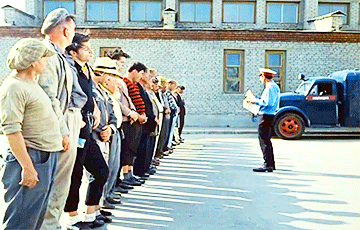Decree On ‘Parasites’: It’s Fearful To Admit Mistake
- Katsiaryna Barnukova
- 18.02.2019, 18:01
- 3,691

Normally, when a person has no income, the state helps them.
The state seems to lack political will to fully abolish the Decree #3 “On the prevention of social dependence”. Therefore, to mitigate it’s norms, the Decree #1 “On the facilitation of the employment of the population” appeared.
The government has once again postponed the introduction of full payment of water heating by citizens who are unemployed in the economy. The authorities are trying to mitigate the norms of even much softer Decree #1.
A 1-month delay will enable people to collect documents and prove that they are not parasites, so that this situation will affect as few Belarusians as possible. Perhaps this is also a reason to postpone payment in full, because in spring it will be less painful for the pocket: in winter, hot water is normally consumed to a greater extent.
Strictly speaking, this was the meaning of the “alteration” of the decree - to soften the approach to the parasites as much as possible. As we see, the amount has decreased, and it is not the tax that is paid, but the increased rent.
True, there is no logic at all in this approach: a person does not work, and for this they are forced to pay taxes and incur increased costs. Usually, if a person has no income, the state helps them, but does not punish them. After all, we are talking about people whose income is very low and who, due to certain circumstances, do not earn themselves. I do not see justice in punishing them with heightened obligations. If you take, for example, a housewife, then, in fact, all the taxes are paid for her by her husband, and from his salary, which is enough for two. Accordingly, taxes are enough for both.r lifestyle because of those 20 rubles, which they will have to additionally pay for communal services.
It is still unclear exactly what the goal of the tax imposed by the Decree #3 was. If the goal is to simply encourage people to work, then such a measure is unlikely to be effective. Those who are subject to the decree do not work for some reason: for example, they cannot find a job or decide, as is the case with housewives, that it is simply more profitable for them not to work. It is unlikely that the decree will force someone to change thei
As shown by a study conducted by BEROC, people are unemployed in the economy mostly in the areas where economic activity is lower. It appears that these are really the people who cannot find a decently paid job. Because of this, they are forced to either remain unemployed (however, they cannot be registered, because we have very strict rules), or go to Poland or Russia to earn money. And many of them do not formalize their departure, and therefore fall into the list of parasites.
Of course, there are alternatives for engaging citizens in the economy. These are active measures on the labor market that help people find a job, retrain, if necessary move to a new place of residence. Such measures have demonstrated high efficiency in other countries, which means that they can bring good results here as well.
One thing I can say for sure: it is impossible to stimulate citizens to work with additional taxes. I think today it is clear to everyone. Therefore, such a mild form of tax payment was chosen - through a higher communal utility bill. And, first, soon we will all pay for housing and utility services at the 100% rate, that is, the penalties for parasites will gradually go into oblivion; secondly, there are many exceptions, exemptions, etc., as a result, in fact, few Belarusians will be forced to pay more due to the fact that they do not work. I hope it will be so.
Obviously, there is no political will to abolish the decree on “parasitism”. Nobody wants to admit that a mistake was made, but there is a desire to mitigate its consequences. It may be that information received about where and under what conditions the unemployed live will still help the state take more effective measures to revive the labor market.
Katsiaryna Barnukova, Academic Director at Center for Economic Research BEROC, belmarket.by









